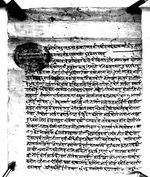A letter from Candra Śamśera authorizing Jimmāvāla Chāṃmvā Khunu to seize and auction off stolen timber (VS 1956)
ID: L_1200_0009A
Edited and
translated by Rajendra Shakya
in collaboration with
Pabitra Bajracharya
Created: 2019-06-28;
Last modified: 2020-12-01
For the metadata of the document, click here
The accompanying edition, translation/synopsis and/or commentary are available under the terms of the Creative Commons Attribution-ShareAlike 4.0 International License
Abstract
This letter from Candra Śamśera authorizes Jimmāvāla Chāṃmvā Khunu to seize and auction off timber stolen from forests in the Doce sector by Tibetans, and orders him to submit 25 mohararupaiyā̃s for the year VS 1957.Diplomatic edition
[1r]
1श्री\[Seal of Candra Śamśera]1स्वस्तिश्रीमद्राजकुमारकुमारात्मजश्रीपश्चीम्तर्फकाकम्यांडीङ्जनर2द्रसम्सेरजंङ्गराणावाहादुरकस्यपत्रम्¯¯¯ ¯¯¯ ¯¯¯ ¯¯¯ ¯¯¯ ¯¯¯ ¯¯¯ ¯¯¯
3आगेजिम्माव़ाल्छांम्वाषुनुकेय़ेथोचित्तऊप्रांन्तअठारसय़ेषोलादो
4तर्फकोवन्मासह्रहदकादुनिञालेपनिकाठ्नकाट्नुवननफाड्
5नुभंन्यारुक्कादस्षत्भैआईगोर्षाअदावाटरोकाय़ाकोवन्मामोगलानीञ्याहरुआई∙
6फुरुठेकाहरुवनाऊनालाईनञारुषकोहागाफाडीकाठ्चोरीलानेगर्छन∙सरहदीय़ाजतिले
7वेअदपीगर्दागाऊगाऊकोमुषिय़ालेसजाये़गर्नेमोगलानीय़ालेचोर्नआउदापक्राऊ
8गर्नकोहीनभैवरवादभय़ाकोछनीजमोगलानीय़ालेचोरीलग्येकोकाठ्षोसीलिली
9लाम्गर्नुभंन्यातेरानाऊमासनदगरीवक्स्यासोलीलाम्काआम्दानीवाट५७साल्वर्ष
10१लाईमोहरू२५ठेक्सर्कारमातिर्छुभनीतिमिलेहाम्राहजुर्माविंन्तीचढाऊदा
11जाहेरभय़ोतसर्थवननफाडनुभनीरुक्कादस्षत्भैआईरोकीय़ाकोगैह्रवन्मोगला∙
12नीय़ालेचोर्नआऊनपाउनेगराऊनहुदैनकसैलेआईचोरीलाग्याभन्याअ
13हदवमोजिम्हाम्रासह्रदभीत्रैमापक्रीनीजहरुलेलग्येकाकाठ्जतिषोसीली
14सोकाठ्लिलाम्वीक्रीगरीलिनुसोआम्दानिवाट५७सालवर्ष१केठेक्मोहरू२[?]सा
15ल५७कोमाघये़कैकीस्ताहाम्रातहसीलअडामावुझाईरसीदलीनुचौकीपहरा
16राषदाषर्चलाग्योलीलाम्वीक्रीकेहीहुनसकेनभनीकवुलेकाठेकमामिन्हामो
17जरापाऊन्याछैनौअैनअंहदवमोजिमनगरीतलमाथिपारीकामकाजगर्याको
18ठहर्योभन्याअैनवमोजिम्तीमि∙आफैलेवुझाऊनुपर्ला५८सालकावालिदे
19षीलाईचोर्नआऊ∙दैरह्यासोठेक्मापछीरआउनछोड्योभन्यासोमाफीक
20कवोलगरुंलाभनीविंन्तीचढाय़ाकालाईय़ामैमाआईसोहीवमोजिमगर्नुभ
21नीदस्षत्गरीवकस्यौईतीसम्वत्१९५६सालमीतीफागुणसुदी१५रोज६शुम्भ्
Translation
[1r]
[Seal of Candra Śamśera]
Hail! A letter from the venerable Western Commanding General Candra Śamśera Jaṅga Bahādura Rāṇā, a prince born of a prince
Āge: To JimmāvālaChāṃmvā Khunu
Yathocita Uprānta: “Even after a restriction [on cutting down trees for timber] was imposed by the GorkhaAḍḍā once a rukkā daskhata had been issued that ordered border people, too, not to lop wood or cut down forest in the Doce sector within the Aṭhāra Saya Kholā region, people from mugalāna1 have been coming and cutting off branches of new trees in forests and stealing them to make phuru and ṭhekā vessels. When border people disrespect [rules], the mukhiyās of villages punish them. When there is no one to arrest people from mugalāna when they come to steal [timber,] the result is devastation. If you issue a sanada in my (lit. your, i.e., the pronoun the issuer of the present document would have used for the addressee in the sanada) name that authorizes me to seize and auction off the timber the said people from mugalāna steal and take away, I shall submit 25 mohararupaiyā̃s for 1 year for the year [VS 19]57 (1900 CE) as a contractual (ṭheka) amount from the proceeds of the auction.”
This came to our notice after you made petition to us with the above-mentioned details. Therefore, a rukkā daskhata having forbidden forest to be cut down, a situation shall not be allowed to arise in which people from mugalāna come and steal forest [products] that have been restricted or the like. If any persons come and steal [timber], then, in accordance with the treaty2 , arrest them within our borders and seize and auction off the timber they have taken away. Submit to our Tahasila Aḍḍā in one instalment, in [the month of] Māgha of the year [VS 19]57 (1901 CE), 2[5] mohararupaiyā̃s for 1 year—for the year [VS 19]57 (1900 CE)—as the contractual amount from the proceeds [of the auction] and get a receipt.
You will not receive any mināhāmojarā3 in the contractual amount that you have agreed to pay by saying that there were costs for making a watch-house and stationing guards or that there was nothing that could be sold at the auction. You yourself shall have to pay if it is proven that you have violated the Ain or treaty and muddled things while performing your duties.
As you made [the following] petition [to us]: “If [people from mugalāna] continue to come to steal [timber], I shall agree to act within [the terms of] the said contract later [as well,] from the harvest of the year [VS 19]58 (1901 CE) onward, and if [they] stop coming [to steal], then I shall agree to act according to that [same] contract (i.e. keep on paying the 25 rupees)," we have signed [this letter], instructing [you,] the petitioner, to come during the season and act accordingly.
Friday, the 15th of the bright fortnight of Phālguṇa in the [Vikrama] era year 1956 (1900 CE). Auspiciousness.
Commentary
This is another document obtained from Nubri that deals with the area that falls under the jurisdiction of the western commanding general. There is another document from Nubri, L_0922_0003, dated VS 1959, that also deals with lands assigned as an emolument to this general. Normally, however, the area falls under the jurisdiction of the eastern commanding general.
At the end of the document, Candra Śamśera instructs the petitioner to come during the ‘season’ to renew or discontinue the contract. It is not clear which season he is talking about. But Article 3 entitled ‘On Tenants and Landlords’ of the Mulukī Ain, the civil code promulgated in VS 1910 (1854 CE), prescribes a certain period within a year for land evictions and reassignments, appointments and dismissals of tenants. In the same way, there probably was a certain period within a year assigned for the renewal of contracts, just as the month of Māgha was assigned as the period for the payment of contractual amounts of lokābhāra lease contracts in a single instalment.

